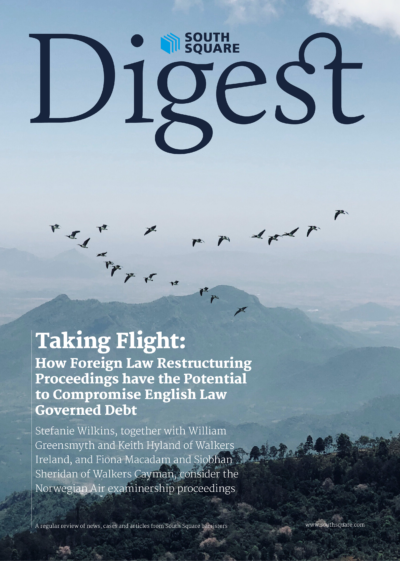

Introduction
The Cayman Islands restructuring officer regime came into force in August 2022 by way of legislative amendments to Part V of the Cayman Islands Companies Act (as amended) (the “Cayman Islands Companies Act”).
It is anticipated that the new scheme of arrangement provisions that were expressly included within the new restructuring officer regime may potentially unlock an opportunity to compromise English law governed debt obligations under Cayman Islands law (which has previously not been possible as a result of the rule in Gibbs1). Support for this argument comes from the Irish case of Norwegian Air2.
In Norwegian Air, the Irish High Court (the “Irish Court”) exercised its jurisdiction to sanction an Irish scheme of arrangement
(“Irish Scheme”) within Irish examinership proceedings. Certain English law-governed claims were to be compromised by the Irish
Scheme. The Irish Court relied on expert opinions provided by Daniel Bayfield KC as to whether the English Court would recognise the Irish examinership and Irish Scheme, and would give the assistance requested by the Irish Court, pursuant to section 426 of the English Insolvency Act 1986 (“Section 426”) (“English Insolvency Act”) (notwithstanding the rule in Gibbs).
This article examines the conclusions that the Irish Court reached in Norwegian Air concerning how Irish insolvency proceedings might be recognised in England and Wales under Section 426. It then explains how this approach might potentially be adopted to allow a Cayman Islands scheme of arrangement (“Cayman Scheme”) within the new restructuring officer regime to be recognised and enforced in England and Wales pursuant to Section 426.
Norwegian Air – Irish Examinership
Irish Examinership
Examinership is a corporate rescue procedure available under Irish law for insolvent companies which is analogous to chapter 11 bankruptcy in the United States and administration in the United Kingdom.
The key features of examinership are that for a period of 70 days (with a possible extension of 30 days) a moratorium on certain creditor action applies. During such time, an examiner (being an independent officer of the Irish Court) examines the relevant company’s affairs with the aim of, if possible, formulating proposals for the compromise and/or restructuring of the relevant company’s liabilities (by way of a scheme of arrangement), with a view to rescuing a company and for such company to continue as a going concern. These proposals are put before meetings of the members and/or creditors of the relevant company and, if approved, confirmation of the proposals is sought from the Irish Court.
Norwegian Air
In late 2020, five companies in the Norwegian Air group, incorporated in Ireland, petitioned for the appointment of an examiner pursuant to Section 509 of the Irish Companies Act 20143 (the “Irish Companies Act”), as well as the appointment of an examiner to a related company, Norwegian Air Shuttle ASA, a company incorporated in Norway (being the parent and main operating company of the group) (“Norwegian Air Shuttle” and together, the “Companies”).
The Irish Court appointed Mr Kieran Wallace of KPMG as examiner to the Companies on 7 December 2020 (the “Examiner”). During the course of the examinership, Norwegian Air announced its business plan for its future operations. The essential elements of that business plan were that:
the group would focus on its core business in the Nordic countries, operating a short haul network with narrow body aircraft;
the group would cease to operate long haul routes;
the group would initially operate up to 50 Boeing 737 aircraft, operating within Norway and other Nordic countries and between those countries and the rest of Europe;
the group would significantly reduce the number of aircraft assets leased; and
the group would reduce the volume of services procured.
Repudiation of contracts
Under Irish examinership law, pursuant to Section 537(1) of the Irish Companies Act, the company ‘in protection’ has the power to apply
to the Irish Court to repudiate onerous contracts that involve the performance of obligations (other than the payment of money) if the examiner believes this is necessary for the survival of the company as a going concern.
Based on the business plan put forward in respect of the Companies, the Examiner considered that in order to effectively implement the proposals and to ensure the continued viability of the Companies, it was necessary to repudiate some 425 contracts with 68 counterparties. The Examiner proposed to address the liabilities arising pursuant to such contracts by way of Irish Scheme.
One of the key issues which arose in the context of certain of the disputed repudiation applications was the issue of jurisdiction. Specifically, the Irish Court was asked to consider whether orders made by the Irish Court approving the repudiation of certain guarantees governed by English law and subject to the exclusive jurisdiction of the Courts of England and Wales could be found ultimately to have been made in vain (that is, because such orders might not be recognised outside Ireland).
Effectiveness of repudiation orders outside of Ireland
Rule in Gibbs
One potential obstacle to recognition in England was the rule in Gibbs, which provides that English law-governed debt obligations are not capable of being compromised by a foreign insolvency process and, conversely, foreign law debt is not capable of being discharged or varied by an English law insolvency process, unless such discharge or variation would be effective in accordance with that foreign law (that is, the law which constitutes the proper law of the debt in question).
Section 426 of the English Insolvency Act
In Norwegian Air, the Companies contended that the Irish examinership and Irish Scheme would be recognised in England, because of the operation of Section 426. Section 426(4) of the English Insolvency Act provides that:
“(4) The courts having jurisdiction in relation to insolvency law in any part of the United Kingdom shall assist the courts having the corresponding jurisdiction in any other part of the United Kingdom or any relevant country or territory.”
The relevant countries or territories for the purpose of Section 426(4) are identified in the Cooperation of Insolvency Courts (designation of relevant countries and territories) Order 1986 (the “Designation of Countries and Territories Order”) – and Ireland is one of the countries designated.
The jurisdiction of the English Court to extend assistance to other countries and territories may be triggered by a letter of request from the other court. Once a request is made, then Section 426(5) provides that the English Court may apply the law of the other jurisdiction, or English law, in the following terms:
“(5) For the purposes of subsection (4) a request made to a court in any part of the United Kingdom by a court in any other part of the United Kingdom or in a relevant country or territory is authority for the court to which the request is made to apply, in relation to any matters specified in the request, the insolvency law which is applicable by either court in relation to comparable matters falling within its jurisdiction. In exercising its discretion under this subsection, a court shall have regard in particular to the rules of private international law.”
Section 426(10) then defines “insolvency law” to include, in England, provision made under the English Insolvency Act (amongst other things). In relation to relevant countries and territories, “insolvency law” includes the law that corresponds to the English law provisions in the English Insolvency Act.
In England, a scheme of arrangement is a procedure that is available under the Companies Act 2006 (the “English Companies Act”), and is not, therefore, within the scope of “insolvency law”. However, in Norwegian Air, what was proposed was an examinership, within which an Irish Scheme was to be promoted. There was some previous authority, which pre-dated the original European Insolvency Regulation4: in Re Business City Express Ltd [1997] 2 BCLC 510, Rattee J had granted an application for recognition of a scheme of arrangement proposed by an Irish examiner, concluding that the examiner was “…roughly (but only roughly) equivalent to an English administrator…”: referred to in Norwegian Air at [2020] IEHC 664, paragraph 117.
Dicey, Morris & Collins on the Conflict of Laws
(15th edition) states that at [30-115]:
“Issues may arise as to when a rule of foreign insolvency law “corresponds” to a relevant provision of English insolvency law. In Re Business City Express Ltd, a request for assistance was received from an Irish court in which the English court was asked to make a scheme of arrangement, entered into in Ireland after a company had gone into examinership there, binding upon English creditors. There was no provision of English law by which this could be done. The [English] court applied Irish law to the English creditors without discussing the question of whether Irish law corresponded to any provision made by or under the [English] Insolvency Act 1986.
It is not the case that the foreign insolvency law needs to be the same as English insolvency law for if this were the case (and it is in any event contradicted by the decision in Re Business City Express Ltd) the notion of applying foreign law would be redundant…”
Mr Justice Quinn, sitting in the Irish Court, was aided in his analysis by two opinions provided by Daniel Bayfield KC, who had been instructed by the Companies to consider the scope and effect of Section 426.
Mr Justice Quinn recorded that Mr Bayfield’s opinion, which drew on Re Business City Express Ltd, had been that Section 426(10) ought to be broadly interpreted in identifying what would be ‘insolvency law’ for the purpose of Section 426 ([2021] IEHC 268, at paragraph 277; see also [2020] IEHC 664 at paragraph 113). Specifically, the Judge recorded that Mr Bayfield’s opinion had been that:
“The authorities suggest that a broad approach should be taken to the meaning of ‘corresponds’ and that it is not necessary that the foreign law be the same as the 1986 Act provisions, or, at least, to involve the same approach or procedure. I say ‘suggest’ because little judicial consideration appears to have been given to the meaning of ‘corresponds to’ within the meaning of s. 426 (10)(d). Nevertheless, the authorities do tend to contain detailed comparative analysis of the relevant provisions”.
Mr Justice Quinn also went on to explain that, adopting this approach, the expert evidence of Mr Bayfield had been that the Irish examinership – and the Irish Scheme imposed as part of it – would be likely to be recognised by the English Court, if a request to that effect was made. Specifically, the Judge recounted ([2020] IEHC 664 at paragraphs 114 and 115):
“Mr. Bayfield examines Parts 9 and 10 of the Companies Act 2014. He says that examinership under Part 10 can only be commenced where the company is unable to pay its debts or is likely to become unable to pay its debts, and therefore:
“…carries the hallmark of an insolvency proceeding and the insolvency proceeding which most closely resembles examinership in England and Wales is the administration regime under Part II of the Insolvency Act, 1986, which can only be commenced if a near identical insolvency is satisfied.”
He concludes that: –
“…the English Court would be likely (if requested to do so) to recognise the examinership and any scheme confirmed by the High Court as part of the examinership, impose a stay corresponding to the stay under s. 520(4) of the Act of 2014 and order that creditors be bound by and take no steps inconsistent with the terms of the scheme of arrangement.”
Thus, the effect of Section 426 was to create a statutory inroad into the rule in Gibbs.
In his judgment, Mr Justice Quinn therefore concluded that: “…[t]he opinion of Mr. Bayfield [KC] is more than credible evidence as to the prospect of recognition of orders made or repudiations effected pursuant to an approval granted under s. 537 [of the Irish Companies Act]. This taken together with the authority of Re Business City Express Limited is good reason for the court to be satisfied that orders made as sought in these applications would not be made in vain”: [2021] IEHC 268, at paragraph 280.
Accordingly, the Irish Court was comfortable that as a matter of English law the repudiation of the guarantees pursuant to an Order of the Irish Court would be recognised and given substantive legal effect in the Courts of England and Wales.
Cayman Islands - New Restructuring Officer Regime
The much-anticipated reforms to the insolvency and restructuring legislation in the Cayman Islands came into force in August 2022. The amendments to Part V of the Cayman Islands Companies Act have introduced, amongst other things, a new restructuring officer regime available to companies in financial distress, which can be accessed without the need to present a winding up petition, thereby providing practitioners and their clients with an alternative restructuring tool. A number of petitions have now been presented by companies seeking the appointment of restructuring officers: Walkers acted as Cayman Islands legal counsel to Oriente Group Limited and Rockley Photonics Holdings Limited in respect of the first two successful petitions for the appointment of restructurings (appointed by the Grand Court of the Cayman Islands (the “Grand Court”) in November 2022 and in February 2023, respectively)5.
Upon filing the application seeking the appointment of restructuring officers, an automatic and standalone restructuring moratorium will immediately arise which will have extraterritorial effect (as a matter of Cayman Islands law6), similar to United States Chapter 11, Irish examinership or English administration, within which a restructuring may be proposed and implemented (by way of a Cayman Scheme, a restructuring process in a foreign jurisdiction or consensually, as between affected stakeholders).
The Cayman Islands legislation for schemes of arrangement is derived from 19th century English legislation. The concept of the scheme of arrangement (together with the requisite approval thresholds to be attained) was first introduced into the Cayman Islands by the Companies Law in 1961 (replicating Section 206 of the English Companies Act 1948).
The recent amendments to Part V of the Cayman Islands Companies Act also included provisions for compromises with creditors and members within the new restructuring officer regime. The current legislation governing schemes of arrangement, as set out in sections 86 and 87 of the Cayman Islands Companies Act, have in essence been duplicated and replicated into the restructuring officer regime (noting that only a restructuring officer under the new sections 91I and 91J of the Cayman Islands Companies Act is able to promote a scheme of arrangement within the restructuring officer regime).7
Recognition of Cayman Schemes promoted by restructuring officers
There have always been legal challenges in compromising English law governed debt obligations by way of a Cayman Scheme as a result of the English law rule in Gibbs applying as a matter of Cayman Islands law (if not technically binding, then certainly having significant precedential value). However, the rationale for the legislative draftsmen in replicating the Cayman Scheme provisions into the new restructuring officer regime appears to enable counsel to potentially put forward the proposition that a Cayman Scheme can successfully and validly compromise and/or discharge English law governed debt obligations (notwithstanding the rule in Gibbs), following the decision in Norwegian Air. This is because, like Ireland, the Cayman Islands is identified in the Designation of Countries and Territories Order.
The inclusion of the ability for a restructuring officer to promote a Cayman Scheme within the new restructuring office regime may have the potential of enabling a Cayman Scheme proposed by a restructuring officer under sections 91I and/or 91J of the Cayman Islands Companies Act to obtain recognition and enforcement in England and Wales under Section 426.
Under section 91B of the Cayman Islands Companies Act, companies may now present a petition to the Grand Court seeking the appointment of restructuring officers on the grounds that the company: (a) is or is likely to become unable to pay its debts; and (b) intends to present a compromise or arrangement to its creditors (or classes thereof), either pursuant to the Cayman Islands Companies Act, or a foreign law or by way of a consensual restructuring.
In light of the fact that English administration: (a) is only available where the company is unable to pay its debts or likely to become unable to pay its debts (that is, insolvent or likely to become insolvent); (b) results in a moratorium on certain creditor action; and (c) the objective of the proceedings is to pursue company rescue, it seems that it could be successfully argued that the restructuring officer regime (including the restructuring officer Cayman Scheme that can be promoted within such insolvency proceeding), is akin and analogous to English administration proceedings under the English Insolvency Act.
Pursuant to sections 91I and/or 91lJ of the Cayman Islands Companies Act, where a restructuring officer pursues and promotes a Cayman Scheme within the new restructuring officer regime (that is, a Cayman Islands insolvency proceeding which is similar to an insolvency proceeding under the English Insolvency Act), the terms of the compromise under such Cayman Scheme may be able to be recognised
and enforced in England and Wales pursuant to Section 426.
It follows therefore that if statutory recognition of such Cayman Scheme is obtained under Section 426, then there is a good argument that, as a matter of English law, this would result in the Cayman Scheme achieving an effective (or substantially effective) and valid compromise or discharge of the English law governed debt obligations, notwithstanding the rule in Gibbs.
Furthermore, the ability for a restructuring officer to be able to promote a Cayman Scheme via two different avenues under the Cayman Islands Companies Act (that is, pursuant to either sections 86 and 87 or sections 91I and 91J of the Cayman Islands Companies Act) was specifically permitted for two reasons: (i) to mirror the position in Ireland that is, that there are two types of schemes of arrangement (an examinership scheme and a corporate scheme); and (ii) to adopt the somewhat analogous position in England whereby there are two mechanisms to compromise debt (a corporate scheme under the English Companies Act, or a company voluntary arrangement under the English Insolvency Act).
Conclusion
The key significance of the Norwegian Air examinership proceedings may well be the recognition of a statutory inroad into the well-established common law principle of the rule in Gibbs which may now provide an opportunity for foreign insolvency proceedings such as Irish and potentially Cayman Islands insolvency proceedings to compromise English law governed debt in certain circumstances.
Norwegian Air – Walkers acted as Irish legal counsel for a syndicate of lenders to certain entities in the Norwegian Air Group.
Oriente Group Limited – Walkers acted as Cayman Islands legal counsel to Oriente Group Limited in respect of the first petition for the appointment of restructuring officers in the Cayman Islands pursuant to Section 91B of the Cayman Islands Companies Act.
Rockley Photonics Holdings Limited – Walkers acted as Cayman Islands legal counsel to Rockley Photonics Holdings Limited in respect of the second successful petition for the appointment of restructuring officers in the Cayman Islands pursuant to Section 91B of the Cayman Islands Companies Act.
1Antony Gibbs & Sons v Société Industrielle et Commerciale des Métaux (1890) 25 QBD 399.
2Artic Aviation Assets DAC & Ors v Companies Act [2021] IEHC 268.
3Arctic Aviation Assets DAC, Norwegian Air International Limited, Drammensfjorden Limited, Torskefjorden Limited and Lysakerfjorden Limited.
4Re Business City Express Ltd deals with Section 426 prior to both the European Insolvency Regulation and the Recast European Insolvency Regulation. The significance of this is that post-Brexit, the position as between Ireland and England essentially reverted to the pre-European Insolvency Regulation position: see Norwegian Air at paragraphs 275-6.
5Re Oriente Group Limited. 11 November 2022 (Unreported; Grand Court; Cause No. FSD 231 of 2022 (IKJ)). Re Rockley Photonics Holdings Limited. 14 February 2023 (Unreported; Grand Court; Cause No. FSD 16 of 2023 (MRHCJ)).
6The moratorium is intended to have an automatic extraterritorial effect, subject to recognition and enforcement in the relevant local territories.
7Another important legislative reform is the removal of the “majority in number” or head-count” test for shareholder schemes of arrangement (for both a corporate shareholder scheme of arrangement (under sections 86 and 87 of the Cayman Islands Companies Act) and a shareholder scheme of arrangement promoted by a restructuring officer (under sections 91I and 91J of the Cayman Islands Companies Act)) such that only the “majority in value” test must be satisfied to approve a proposed shareholder scheme of arrangement at the relevant scheme meetings.











![Brake & Anor v The Chedington Court Estate Ltd [2023] UKSC 29](https://southsquare.com/wp-content/uploads/2024/02/Brake-Anor-scaled-e1728649908896.jpeg)







